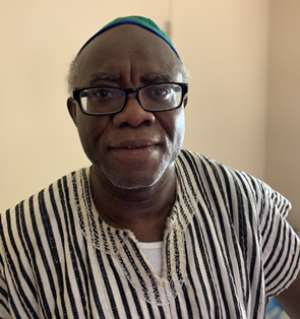
We often forget the fact that for the 20-year period that the late Chairman Jerry John Rawlings ran the country, first, as a maximum dictator of the military junta that was the Provisional National Defense Council (PNDC) and then, as the democratically elected President of the Sovereign Democratic Republic of Ghana, little cable and transformer upgrades occurred by way of the regular maintenance or repair works of the country’s electricity and general power distribution system. This is what, according to Ghana’s new Energy Minister, Dr. Matthew Opoku-Prempeh, is squarely to blame for the recent power outages in the country (See “ ‘How Could This Be Dumsor Compared to Mahama’ – Napo Asks” Modernghana.com 4/6/21).
The fact of the matter is that it is still “Dumsor,” when you cannot have the lights on for, let’s say, more than a week or two at a time without interruption. The good news here is that over the course of the last four years, under the landmark and auspicious watch of President Addo Dankwa Akufo-Addo, the country fared much better, with an overwhelming majority of the businesses that literally went under during the previous John “Akonfem-Kanazoe” Dramani Mahama regime, kicking back into operation. During this period, we were made to simply understand that the problem had primarily to do with woefully inadequate energy supply. It would later turn out, to utter horror, that, indeed, there actually existed an overproduction of electricity or energy, and that the problem may equally have had to do with prompt and around-the-clock payment of the bills for power supply.
Contractual agreements, we were also informed, were being grossly incompetently negotiated and executed or signed. There was the striking example of the natural-gas deal with Equatorial Guinea, which Mr. Kennedy Ohene Agyapong, the Assin-Central’s New Patriotic Party Member of Parliament, told the country had to be significantly renegotiated down to nearly half of the original contractual compact. Now, we are talking about billions of dollars here! It was almost as if under the previous Mahama regime, we had had a bunch of mentally irredeemable retards managing our energy and petroleum industry. So, of course, it was all well and good that Ghanaian voters had ousted the Mahama Looting Brigade.
Now, Dr. Opoku-Prempeh, the Energy Minister, tells us that many of the power lines in the country were laid or installed as far back as the 1950s and the mid-1960s, that is, at least six to seven decades ago without any socially responsible thought by our leaders of having them upgraded, much less regularly repaired or maintained. The real truth, I viscerally suspect, may be all the foregoing and a bit more. Whatever the true and real case scenario may be, it still ought not to have taken the present Akufo-Addo Administration some four long years to alert the general Ghanaian public about what we are presently being told by Dr. Opoku-Prempeh. I think I once even heard the recently reappointed Akufo-Addo Senior Minister, Mr. Yaw Osafo-Maafo, bitterly complain that Dumsor had become a grim reality of life in Ghana today because the late former President Jerry John Rawlings had taken a cheap and populist approach to the rural electrification of the country, instead of pragmatically and commonsensically matching our energy production capacity as a nation to distribution output.
As well, as I vividly recall, Mr. Osafo-Maafo touched on the integrity or wholesomeness of the state of Ghana’s energy production capacity. In other words, according to the former Sports and Finance Minister under the tenure of President John Agyekum-Kufuor, the Akosombo Dam’s power network was never fully completed. But, naturally, as a “revolutionary populist politician,” all that Chairman Rawlings seemed to have been primarily focused on was ingratiating himself with residents of the country’s rural communities, particularly those in the northern half of the country, for votes, come election time, and not the expenditure and long-term impact of his populist policy initiatives.
Well, now that we know that the real problem is that of lack of adequate maintenance and poor systems upgrade, what the overwhelming majority of Ghanaian citizens may be literally dying to know is a comprehensive timetable devised for resolving this protracted and perennial problem and, equally importantly, a timetable for keeping up with new technological innovations and major developments in the energy production and distribution industry. It is time for Jubilee House and the Energy and Finance ministries to wake up, sit up and sing us some classical gospel songs of truth and reality.
*Visit my blog at: KwameOkoampaAhoofeJr
By Kwame Okoampa-Ahoofe, Jr., PhD
English Department, SUNY-Nassau
Garden City, New York
April 10, 2021
E-mail: [email protected]




 NPP Performance Tracker prioritise toilets over substantive infrastructure dev’t...
NPP Performance Tracker prioritise toilets over substantive infrastructure dev’t...
 Ghana, other election bound-countries must build fiscal buffers – IMF admonishes
Ghana, other election bound-countries must build fiscal buffers – IMF admonishes
 Parliament reconvenes late May, denies Speaker Bagbin delaying recall over NDC t...
Parliament reconvenes late May, denies Speaker Bagbin delaying recall over NDC t...
 $100m needed to revitalise Ghana's poultry sector — GNAPF
$100m needed to revitalise Ghana's poultry sector — GNAPF
 Driver arrested for causing train collision on Tema-Mpakadan Railway Line
Driver arrested for causing train collision on Tema-Mpakadan Railway Line
 Police grab trucker for Tema-Mpakadan rail accident
Police grab trucker for Tema-Mpakadan rail accident
 Gov't plans to revise traditional customs following Gborbu child marriage
Gov't plans to revise traditional customs following Gborbu child marriage
 Franklin Cudjoe fumes at unaccountable wasteful executive living large at the ex...
Franklin Cudjoe fumes at unaccountable wasteful executive living large at the ex...
 I'll 'stoop too low' for votes; I'm never moved by your propaganda — Oquaye Jnr ...
I'll 'stoop too low' for votes; I'm never moved by your propaganda — Oquaye Jnr ...
 Kumasi Thermal Plant commissioning: I pray God opens the eyes of leaders who don...
Kumasi Thermal Plant commissioning: I pray God opens the eyes of leaders who don...
